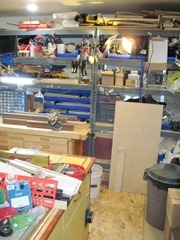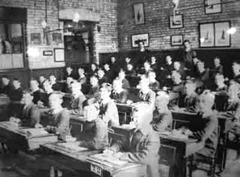What is Full Spectrum War?
First off it is not Total War. Total War is that form of war done between Nation States that sees the productive capacity of a combatant Nation as the source of its military power and is a valid target for waging war. This form of war is one that has seen Sherman's March as part of a Grand Strategy to remove the South's productive capacity to support war as one of its modern forms. In Ancient time's Hannibal's attack on Rome to remove its capacity to wage war was an earlier form of this. Similarly by the accounts we have from Homer it is clear that during the Trojan War the Achaean Greeks set upon the trading partners and allies of Troy to denude it of protection and economic support – thus the siege was not one meant to take place in a single year (as soldiers did tend to go home during parts of the siege making it an annual affair at Troy) but to slowly wage a war of attrition on Troy. Economic attrition is at the heart of Total War and the faster it is done the faster the conflict ends.
Full Spectrum War is not Total War.
Full Spectrum War is not done in the Public War venue alone and is not waged, necessarily, against Public Enemies. It can be utilized against Public Enemies (ie. Nation States) and has been utilized in multiple conflicts via the use of Privateers. Privateers are not Mercenaries as they do not work for cash paid for by a Nation State. Privateers are granted Letters of Marque and Reprisal against enemies named on such letters, and those enemies are targeted to have their goods taken or destroyed by the Letters. Privateers live by Takings under such Letters and they seek to take the goods of a named enemy (and the conveyance of it is usually included in that, although that can be exempted by the Nation handing out such Letters) and then have them certified via an Admiralty Court so that such Taken goods can then be utilized or reduced to monetary value via the means of auction. The US has deployed Privateers up to the US Civil War and the US generally announces if it will be seeking to use them during conflicts. Of course such announcements can be overturned by Congress as it is the holder of the Private War Powers.
Full Spectrum War is thus a form of War done in the Public and/or Private venues. It is particularly useful against Private Enemies which are non-Nation State in nature, as they live a form of hand to mouth savage existence based on preying upon others via the use of Private War.
What is Private War?
Private War is that form of war conducted by individuals or groups of individuals without the sanction of any Nation State. Those waging such Private War are a threat to all mankind and the entire Nation State system as they are not accountable to any law but that of Nature by their own actions. By stepping out from the Nation State system they revert to Natural Law as their means to survive and that makes them predatory and waging opportunistic war as part of their savage nature. Those waging Private War no longer agree to Civil Law nor Military Law (which is part and parcel of Civil Law as it is administered by Governments), they set their own goals by their own standards which are not amenable to Moral Law as they make that up as they go along. Thus the only form of law they are accountable to is that of Nature which is common to all Natural Beings. Private War is waged by such people who have stepped from civilization and those waging it are no longer considered civilized humans. This was an active decision on their part, forced upon them by no one, and once that step is taken there are very few ways to get back into civilized life.
Full Spectrum War is that form of war that is suitable to such savages who wage war for their own sakes and do not seek the trappings of civilization to do so. They fight without uniforms, without a civil code that they are accountable to, they do not fly a recognized flag and those that are under their power are not there voluntarily. Without a government, without a command structure, without a civil code, without a military code, without uniforms and by holding individuals captive under their power and giving them no civil choice or input into what is done, those that wage Private War are savages by their own intent and actions. As they are not a Nation State, no matter what they call themselves, they are not amenable to international law between Nations as they have stepped from the system of Nation States as well. Via the Law of Nations as known at the Founding and Framing of the US, these individuals are known to have many names but fall under the general category of Pirates.
What are Pirates?
Pirates are those individuals who wage Private War to their own ends and have stepped away from Civil Law and the Law of Nations to take on humanity for their own purposes. Pirates are not limited to any geographic region, to any single place and are defined solely by being individuals who wage war on their own. Pirates are not limited to the sea and have been noted since the beginning of history as being on land as well as at sea. The sea is a form of transportation for those waging Piracy against mankind, and Pirates have attacked on land, at sea, and in hijacking aircraft they also attack from the skies. Wherever humans walk away from the restrictions of Civil Law and the Law of Nations to declare themselves independent of all mankind and against the order of Nations is where you will find Pirates. Anyone has the possibility to revert to being a savage and when done by a civilized human it is conscious act. There are no trappings to Piracy, no requirement for ships, parrots, peg legs, hooks for hands, rum, eye patches, or even a black flag with some terrifying image on it. When such savages form into bands they will often take on trappings and Take conveyances, and then Take whatever they want including lives. Pirates have lived by many means: raiding ships, raiding ports, raiding villages and farms, and raiding Nations which contain all those civilized forms of life.
Terrorists wage Private War and are thusly Pirates. As has been noted terror is just a tactic in warfare, and it can be used in either the Public or Private venues of War. Those who take on the tactic but are under no Nation State sanction then fall into the category of Pirate. Calling them by the tactics they use is trying to sugar coat what those tactics are part of when not done by Nation State sanction, and is a means to try and streamline base savagery into our lives so as to bring down the order of Nations via corrupting our understanding of what is and is not civilized in the realm of War. Public War has restrictions upon it, and those waging it are to declare it, name their enemies, go through the proper civil means for their Nation to wage it, and then to be accountable to other Nations in their waging of war via the Treaties that Nation has signed for fighting Public War. When anyone tries to put Pirates into the categories reserved for those fighting Public War, they are seeking to corrupt our civilized understandings of the differences between Public War and Private War: between civilized war and savage war.
Full Spectrum War takes place in multiple venues, not just of War but of Law as well.
The Piracy Codes set up a system of announcing who Pirates are. That puts other Nations on notice that any individuals or groups considered as Pirates by one Nation are a threat to them, as well. There are only two sides to Piracy: civilization and savagery. There is no 'but they want the right thing' with those who are Pirates, as doing the right thing in warfare requires Nation State sanction. Imagine what the world would look like if anyone could wage war for any reason they wanted without any restriction upon them. What you get is not a civilized world, but one gone to the red of tooth and claw. We set aside our Negative Liberties to wage war and utilize the Law of Nations to create means to restrict Negative External War via Civil Law. The Positive Liberty of War, that of self-defense against those waging War is primal to all living things and cannot be separated from them. Any mother or father defending their children have the Positive Liberty of War on their side. If you are confronted by those utilizing aggressive, attacking means against your life, that of your family, your property or against your neighbors, you have the Positive Liberty of War available to you. Any felon who has served their time may take up arms in defense of themselves and then hold themselves accountable for doing so and no court in any land will convict them for that taking up of arms in purely defensive posture. Those who step from the fold of civilized life have reclaimed their Negative Liberty of War to themselves, as is their right via Natural Law. That puts them outside of Civil Law and the Law of Nations, however, and there is nothing good nor admirable about waging war to your own ends as that is savage and uncivilized, both.
Thus the Civil Law has Piracy Codes so that those aiding and abetting Piracy can be brought to heel as well as those committing it be brought to civil justice. Those acquitted are considered to be civilized in nature and the surest way of clearing yourself of any charge of waging Private War, which is to say Piracy and its sub-species of 'terrorist' is to voluntarily give yourself up to civil prosecution under law. Indeed, to clear one's name you voluntarily step back into the fold and DEMAND that you be prosecuted. Sadly that is not available to you if you have been caught actually committing Piracy which is to say 'terrorism'. Then the codes of Military Justice are the recourse, via the Courts Martial, and those have specific items for those who do not wage regular war under such International Agreements as the Hague and Geneva Conventions. Indeed, waging Private War puts one afoul of multiple parts of both Conventions on how and when to wage war, how to treat Private Property, and how to conduct oneself when at war. In point of fact the general activities of 'terrorists' or Pirates falls under the 'Spies and Saboteurs' part of the Geneva Convention, which has summary execution as its outcome. Under the Hague Conventions there are escalating penalties for the abuse and wanton killing of civilians with no National sanctions, taking or destroying private property without due orders of a Nation, and in general conducting war outside of the Nation State sanctioned system runs one afoul of the entire set of Hague Conventions which can give one a terminal end via a Court Martial.
Another means via the Civil Law and Military Codes is the sanctioned takings from Enemies via those designated via a Nation State with Letters of Marque and Reprisal. This is the sanctioned means that all Nations have available to them, even if they signed a treaty saying they would not do such things a Nation needing such activities can then indicate via the means within the Treaty that they will no longer be following such parts of those agreements governing such actions. Treaties are VOLUNTARY in Nature between Nations and can, thus, be stepped away from as well. Even those forced upon a loser in a war are considered voluntary so that the conflict may end in agreeable manner, but those can be stepped away from as well. The Occupation of the Rhineland was a sure step that indicated that Germany was no longer bound by the Treaty of Versailles. The ABM Treaty is considered defunct as well. So is the Washington Naval Treaty governing the number and types of ships and what armaments they can carry. All sorts of treaties are stepped away from or just abandoned or considered defunct because all the signatories are violating it and no one wishes to enforce it. In fact no Nation wishing to enforce a Treaty it signed is a sure indicator that a Treaty is dead.
From this Full Spectrum War can be seen as having multiple components:
1) Public War via Nation State Military means.
2) Civil Law prosecution via the Piracy Codes.
3) International Law prosecution via agreed-upon Treaty language.
4) Civil Law based Military Codes for the granting of individuals or groups with Letters of Marque and Reprisal and granting of Takings and reduction of same so that such individuals and groups can find a means to operate. This is an economic aspect of war against those waging Private War that has not been deployed.
5) Proactive support of the Positive Liberties of War which is to say the Civil Right of Self-Defense for all civilized humans.
6) Treaty enforcement of wartime obligations upon combatants in war.
7) Utilizing the understood threat of Pirates to all Nations and to seek the extinguishing of those individuals and groups wherever they arise by all civilized means necessary in all venues.
To consider oneself civilized that is what one must support.
There are no favorites to play with savage man seeking to enforce their will upon all mankind. If they cannot demonstrate that they are seeking to be part of the civil order of Nations, then those who fight on their own for their own reasons to their own ends are a threat to everyone without exception.
Being civilized is more than just leading one's life under civil law. It has duties, obligations and requirements for individuals to fulfill so that civilization does not get liquidated by our savage nature. We agree to the limits that come with being civilized, and those limits are a great strength, not a weakness, as they requires us to be creative in our means of addressing savagery and yet remain civilized. Those who have gone savage are under no such compulsion and their wanton killing, destruction and enslavement of their fellow man is clear to see, but only if one opens one's eyes to actually perceive what is going on.
Being civilized isn't about being nice. There is a time and place for that, and there is no place for it with those who wantonly wage savage, predatory Private War. Those who do so must be opposed in all venues, simultaneously.
That is Full Spectrum War.




















 Supporting Friends and Allies
Supporting Friends and Allies





